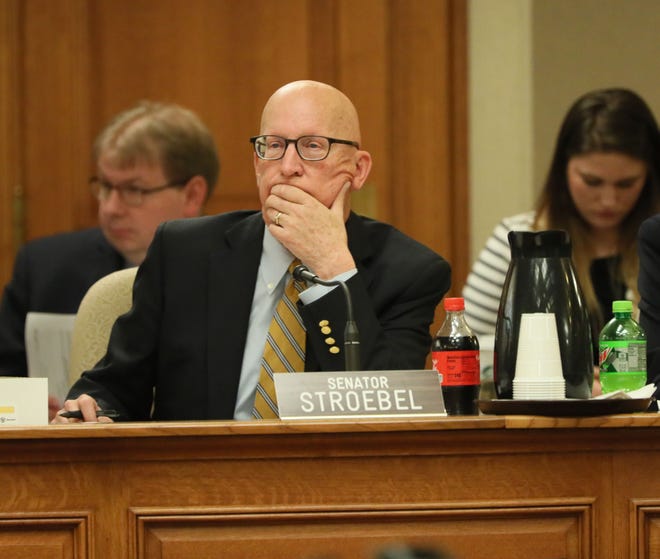Republican lawmakers seek to withdraw Wisconsin from group that has caught ‘scores’ of cases of double voting

MADISON – Two Republican lawmakers are proposing to remove Wisconsin’s membership from a nonpartisan national organization that has allowed state election officials to catch “scores” of voter fraud cases.
Sen. Duey Stroebel of the Town of Cedarburg and Rep. Ty Bodden of Hilbert released legislation this week that would remove Wisconsin from the Electronic Registration Information Center, known as ERIC.
The organization comprises 25 states and has become a target of Republicans since former President Donald Trump launched a baseless campaign to discredit election systems in key battleground states, including Wisconsin, after he lost reelection in 2020. Earlier this year, Trump called on GOP-led states to withdraw from ERIC.
More:‘Chasing ghosts’: Election officials debunk false voting claims made to Wisconsin lawmakers
Eight Republican-controlled states have dropped their membership since 2022. Driving the exodus, in part, is the organization’s effort to increase access to voter registration by requiring states as part of their membership to reach out to residents who are eligible to vote but not registered, according to the nonpartisan National Conference of State Legislatures.
Bodden and Stroebel in a memo to colleagues seeking support cited the voter outreach as a reason to withdraw, arguing the focus “has led many to question whether ERIC’s architects placed more of a priority on registering voters as opposed to ensuring the accuracy of voter registration lists.”
In a post on Truth Social, Trump characterized ERIC as a “terrible Voter Registration System that ’pumps the rolls’ for Democrats and does nothing to clean them up.”
But Wisconsin routinely gets information about voters who may have moved from ERIC, which identifies such voters using U.S. Postal Service change-of-address requests and vehicle registration information.
ERIC provides reports to state officials on which residents are eligible voters and not registered but how to use that information is up to state officials. ERIC’s processes do not indicate a political leaning, according to the NCSL.
Don Millis, the Republican chairman of the Wisconsin Elections Commission, said the commission has caught a number of cases of voters casting ballots in two states because of Wisconsin’s membership in the consortium.
“ERIC has been instrumental in our ability to uncover election fraud. We’ve been able to refer to district attorneys scores of people who, it appears based on the information from ERIC, voted in more than one state. Without ERIC, we wouldn’t have that ability to make those referrals,” Millis said.
“It doesn’t happen a lot but it does happen. To maintain confidence in elections, we need to be able to prosecute double voting when it occurs. And so it would be a bad idea to remove us from ERIC. To me, it’s just totally counterproductive.”
Millis added, “There have been some allegations about ERIC’s malfeasance but I’ve never seen any evidence of that.”
Meagan Wolfe, the Wisconsin Elections Commission administrator who has become a target of legislative Republicans, has had leadership roles on ERIC’s executive committee and is a current board member.
Spokesmen for Bodden and Stroebel did not answer how Wisconsin officials will catch double voting without ERIC’s data from other states.
Wisconsin Republican lawmakers voted to join the consortium in 2016 as part of a law that created online voter registration in the state. Voting to join ERIC were Stroebel and GOP legislative leadership, including Assembly Speaker Robin Vos, Assembly Majority Leader Tyler August, Senate Majority Leader Devin LeMahieu and Senate President Chris Kapenga.
All Democrats voted against the 2016 bill, including Senate Minority Leader Melissa Agard, who was a member of the Assembly then, and former Assembly Minority Leader Peter Barca.
Democratic Gov. Tony Evers is likely to veto the legislation if it lands on his desk but Republican lawmakers are close to having enough members to override Evers’ vetoes.
Senate Republicans have a two-thirds majority, giving the caucus the power to override vetoes. In the Assembly, Republican members are short of a veto-proof majority by two members. If enough Democrats are absent when Republican leaders seek to override a veto, it could be successful in the Assembly.
Molly Beck can be reached at molly.beck@jrn.com.
This article has been archived for your research. The original version from Milwaukee Journal Sentinel can be found here.
